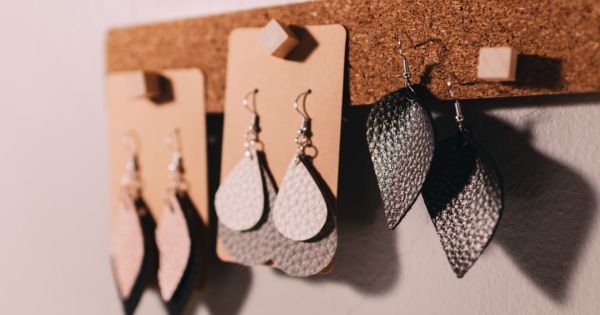During the coronavirus pandemic, millions have lost their jobs due to temporary closures and permanent layoffs. And since up to 70% of all business partnerships fail, secure jobs are hard to come by. But regardless of whether you’ve retained your employment and are simply looking for a new side hustle, you may want to put your talents to good use by opening an online storefront.
After all, online shopping reached new heights during this health crisis. Manufacturing workers accounted for 8.5% of the U.S. workforce, but many of the goods that are produced there and elsewhere are now sold over the internet. And should a second wave hit, many brick-and-mortar retail locations will likely be forced to once again close their doors to the public -- leaving consumers with no other option but to rely on e-commerce sites.
Undoubtedly, Etsy was one of the most popular platforms at the start of the pandemic, especially in regards to cloth face coverings. The well-known online marketplace was one of the best places to get face masks, particularly because other kinds of PPE were hard to come by in March and April, and it provided a great opportunity for shoppers to support small businesses from across the country and even around the world.
What’s more, Etsy prepared their sellers well for the potential shopping boom: on April 3, the day the White House announced that Americans should wear face masks in public, Etsy contacted their sellers and advised that they begin making and selling cloth coverings. Just days later, buyers reportedly searched for face masks on the platform nine times per second, on average. Not surprisingly, Etsy sales soared as a result.
Whether you plan to sell homemade face masks or have another product you’d like to promote online, Etsy can be a good platform to do so. Many makers prefer to use this marketplace rather than their own website, as Etsy can offer a much wider reach. That said, you’ll want to be aware of common mistakes that newbie sellers make in order to get the most you can out of the platform.
MISTAKE: Underestimating the Importance of Product Photos
Etsy, like many other online marketplaces, is a highly visual platform. In many ways, the platform is one of the most aesthetically pleasing thanks to its design. But in order to stand out for the right reasons, your product photos need to be stellar. You can’t rely on descriptions, tags, or product features to sell these listings; most consumers will be drawn in by your product photo first (and will probably reject your shop if the photos aren’t visually enticing enough). Etsy itself says that poor-quality product photos are the top mistake made by sellers.
That doesn’t mean you need a fancy camera or studio; mainly, you just need good lighting, a steady hand, and a creative eye. Get yourself some cheap studio lights or a lightbox, use some craft paper as a background, and practice with your smartphone before you create your first listing.

MISTAKE: Selling Prohibited Products
It’s important to note that you can’t sell just anything on Etsy. Typically, Etsy listings are either handmade or vintage items and will often fall into the categories of clothing, jewelry, beauty, personal care, accessories, and home decor. Etsy does not allow the sale of prohibited items like alcohol, drugs, tobacco, pornography, firearms or other violent items, and even certain animal products. You should be sure to double-check Etsy’s platform policies to ensure your brilliant product idea is actually allowed.
You’ll also want to proceed with caution if your handmade items involve copyrighted materials. Etsy takes copyright and trademark infringement pretty seriously, particularly in regard to large companies (like Disney, Dr. Seuss, sports teams, and more). If you’ve used copyrighted characters or names in your product, you could risk having your listings deactivated. So while there have been over 200 million copies of Minecraft sold and there may be many listings you’ve seen using characters from computer and video games, it’s best to steer clear of utilizing any likeness, logo, or other copyrighted copy you don’t have a license to use. If you want to sell something inspired by a popular show, movie, or cultural phenomenon, be incredibly careful to ensure there’s nothing illegal about the design.
MISTAKE: Failing to Market Your Business
Even after you’ve opened your store and created your product listings, your work isn’t close to being over. Unfortunately, you can’t simply sit back and wait for the money to roll in. You need to actively market your shop, particularly on social media, in order to catch the eye of people looking for products like yours. Facebook and Instagram are especially powerful tools for Etsy sellers, but many people have also turned to Tik Tok and even Snapchat to get the word out. You’ll also need to use appropriate tags with relevant keywords so that your products show up in searches conducted on Etsy. You might even want to consider running Etsy ads (or social media ads) to promote certain products or to improve your brand visibility. You don’t necessarily have to spend a lot at once, but keep in mind that running an Etsy shop isn’t necessarily going to provide you with a passive income; you’ll need to put the work in if you want to see the returns.
Whether you’re looking to have an additional source of income during the pandemic or you just want to show off your creative outlet, an Etsy store can be a viable option. But in order to be a successful seller, you’ll want to avoid these common mistakes. By conducting thorough research and ensuring all your ducks are in a row, you’ll be able to stand out from the crowd and entice customers to make a purchase.

